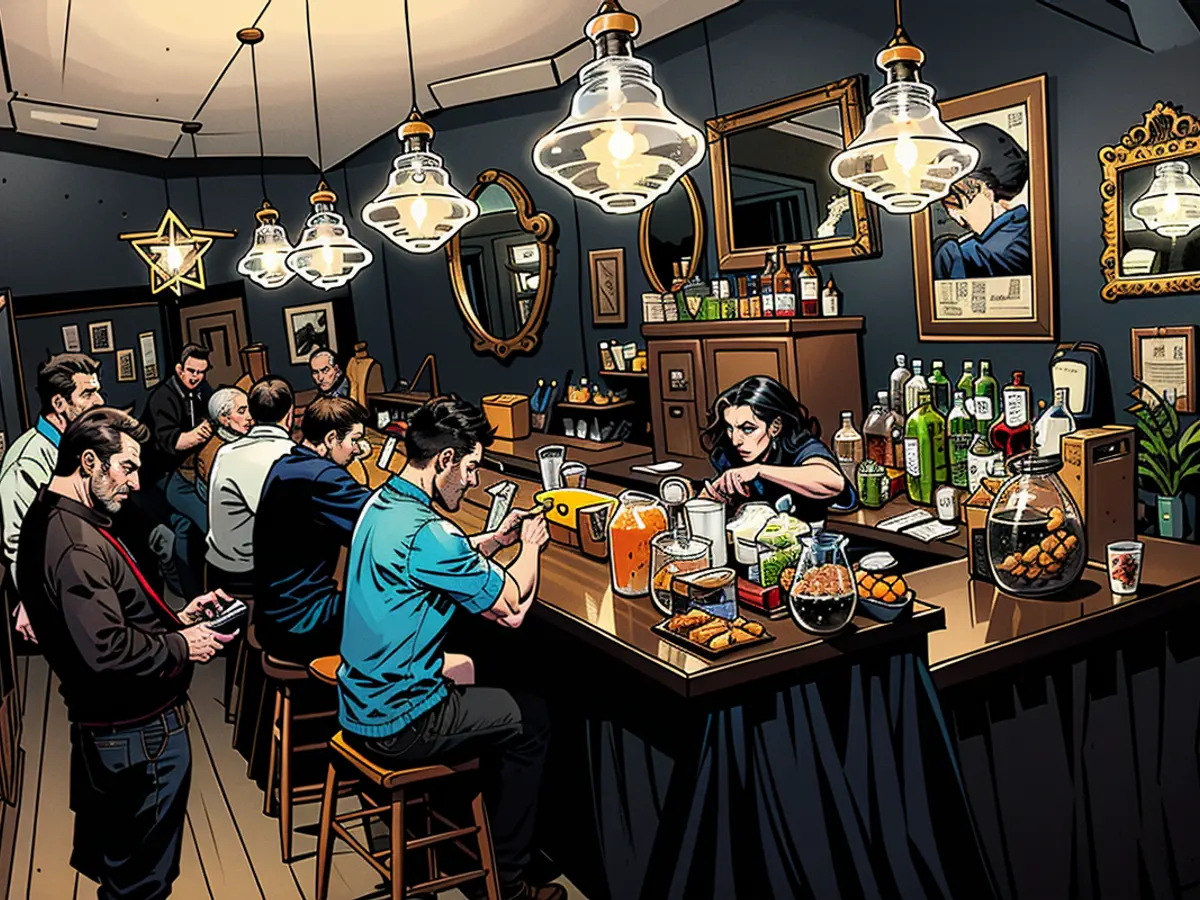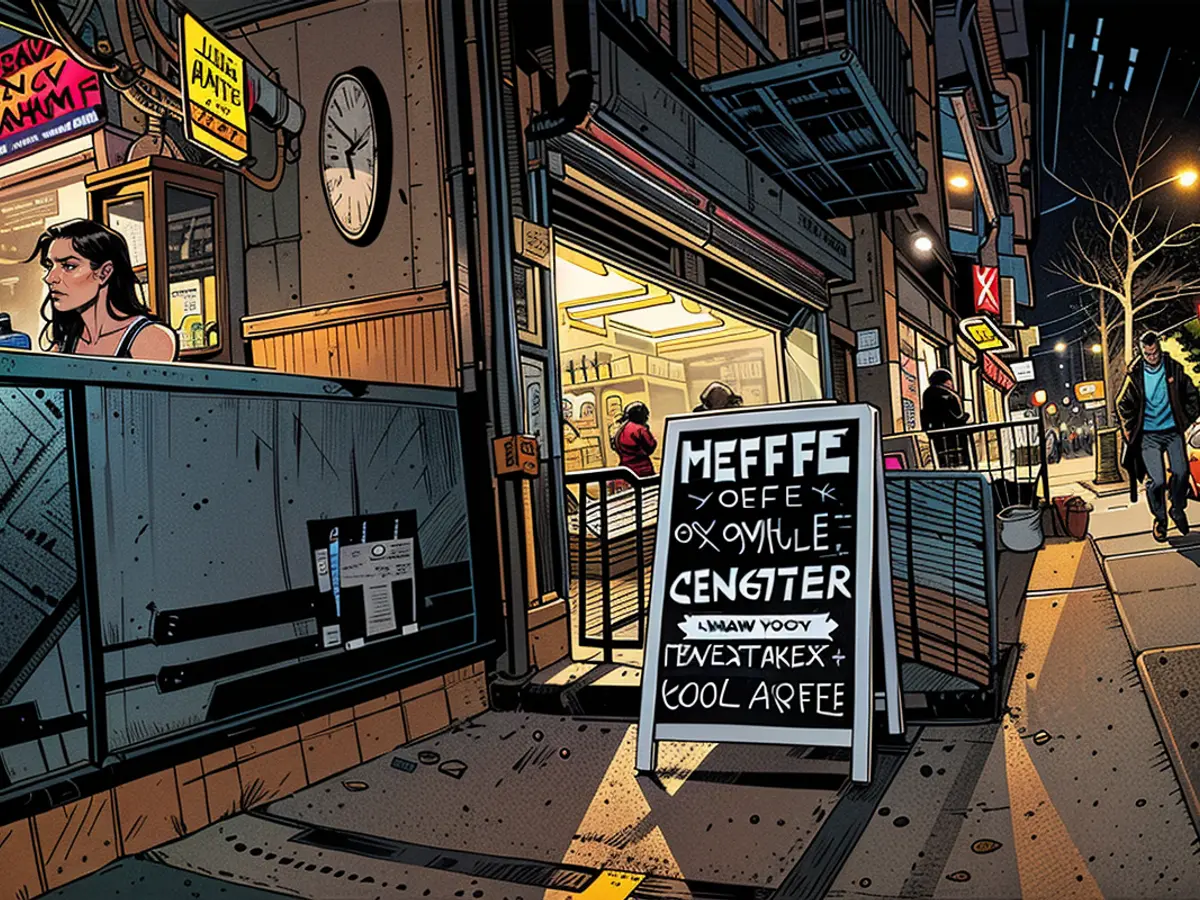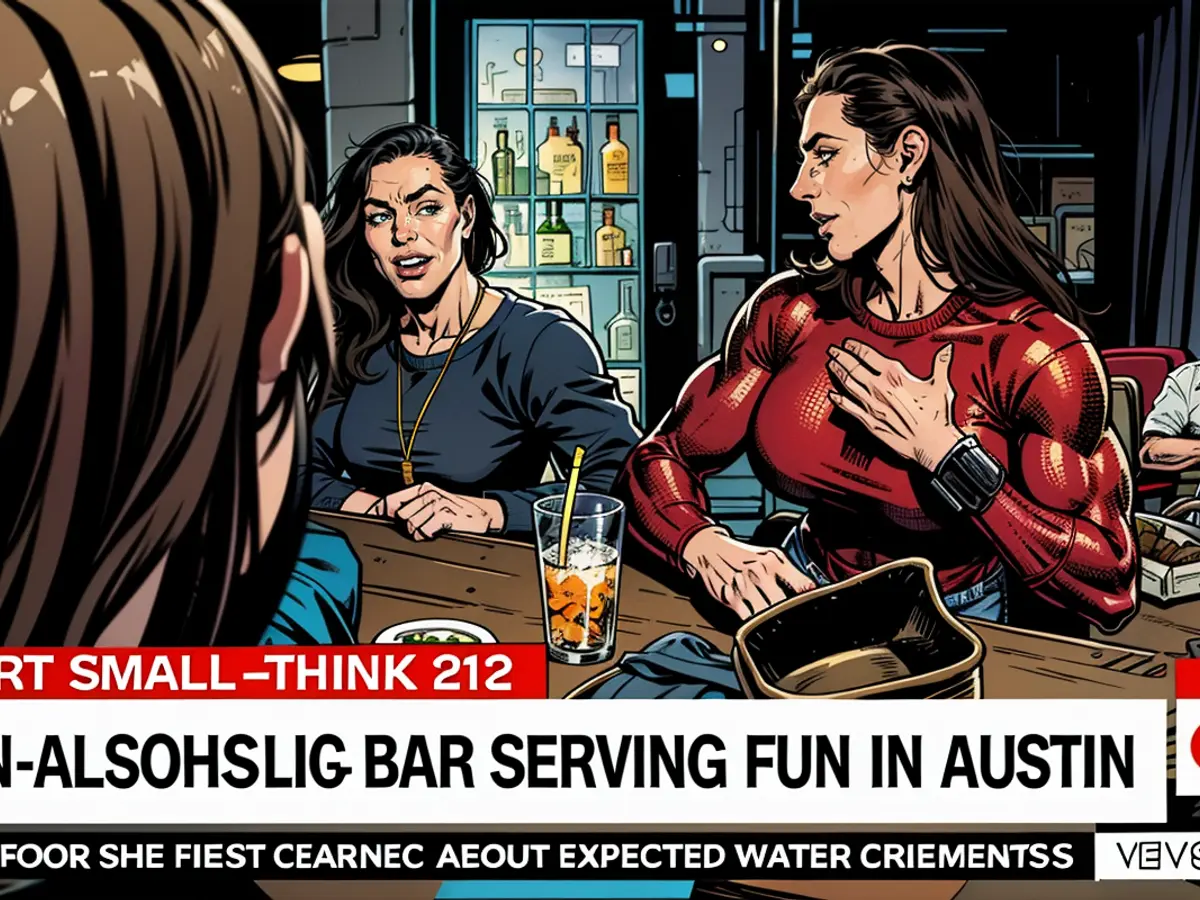These bars are making delicious cocktails — with none of the alcohol
And every time someone asks for a vodka tonic or another familiar well drink, he has to gently remind them that his bar, Sans Bar, serves no alcohol.
“I can definitely help you with the tonic, not so much the vodka,” he said.
So he’ll hand them a menu, where there are classic cocktail riffs and unlikelier combinations. There’s a “nada colada,” which mimics the tropical taste of a piña colada but with a photogenic infusion of alcohol-free blue curacao syrup. A newer addition of which Marshall is particularly proud, the Burnet lush, samples the garden, combining chlorophyll, asparagus brine, lemon juice and botanicals for something springy.
But at Sans Bar in Austin, Texas, the cocktails aren’t the star. The customers are.
“We make it about the experience and connection, not the drinks,” he said. “I mean, the drinks are amazing. But so much of what it means to be a bar is to be a place where people meet.”
Marshall is a member of a small class of sober bar owners who want to upend the idea that bars are exclusively places where alcohol is served. He and other sober bar impresarios believe bars should be community hubs where you can have fun without imbibing anything alcoholic.
And as the non-alcoholic beverage market steadily grows, so have sober bars. They operate in New York and Los Angeles, in Orlando and Sacramento, Atlanta and Omaha. And they’re steadily growing their base of customers, including those who still drink but are exploring sobriety and people in recovery from substance use, by redefining what a bar can be.
“As much as it’s a bar, I try to treat it like a classroom, where we’re learning how to socialize without alcohol,” Marshall said.
Sober bars are social hubs without alcohol
A sober bar usually looks and feels like any other. It might be upscale and minimalist or divey and lived-in. There may be handles lined up behind the bar but these bottles are zero-proof. Sober bars serve beers and wines that are non-alcoholic (though they can sometimes contain up to 0.5% ABV, or alcohol by volume, the Food and Drug Administration’s threshold for a beverage to still be considered non-alcoholic). And then there are the cocktails with all the trimmings but none of the liquor.
Many sober bars also serve coffee or drinks made with CBD or kava, a psychoactive root that, when consumed, can produce some mild sedative effects.
Marshall, though, refuses to serve coffee at Sans Bar, which is only open on Fridays from 6 p.m. to midnight.
“A coffee shop is a place to meet friends,” he said. “A bar is a place where you can meet strangers.”
That social principle is what convinced Abby Ehmann, who already owned a bar in New York’s East Village, to open up a sober joint across the street.

Bars have always been, first and foremost, gathering places. Ehmann’s first bar, Lucky, quickly turned into a beloved neighborhood joint with regulars who started showing up not just to drink, but to enjoy weekly game nights, live music and each other’s company.
Ehmann isn’t sober herself, but she “felt pretty strongly that people who don’t drink alcohol deserve a place to socialize that’s comfortable and welcoming.” Their own Lucky.
So in 2022, Ehmann opened Hekate, a “café and elixir lounge,” which serves both Instagrammable mocktails and casual cans of Pabst Blue Ribbon in a skinny, dimly lit room. Hekate is completely alcohol free (and so is the PBR).
It’s not always easy to convince people to open up to each other without the “social lubricant” of alcohol, Ehmann said. So she built a bar that facilitates intimacy — most of the seating is up at the bar, and customers are encouraged to work with their bartenders to whip up a personalized drink that could end up on the seasonal menu.
“To me, an ideal bar is long and narrow, so you have to walk by everyone in order to go to the bathroom,” Ehmann said. “The foot traffic allows for more mingling.”
At Hekate, she serves all kinds of customers, most of them sober. There are people who are sober for the moment — she’s hosted several baby showers there — or sober for religious reasons. “Sober October” and “Dry January” are busy months, naturally, but many of those temporarily sober folks keep coming back all year.
“It’s easy to come in for a spell,” said Lux Heljardóttir, a rune reader who frequents Hekate. “Three minutes, if you let it, easily becomes three hours and you’ll leave happier than you entered.”
The witchy vibe, eclectic menu and amiable regulars have drawn Dylan Kapit into Hekate around once a week this summer. Though they’re partial to the non-alcoholic beers and wines, their current drink of choice is a liquor-free gin and tonic.
“As a sober person, it is amazing to have a chill place that I can go where I can hang out and order mocktails without any judgment,” Kapit told CNN.
People are drinking less as non-alcoholic drinks become more popular

Sober bars are finding their footing in part due to the growing sober-curious movement.
People are becoming increasingly conscious of the deleterious effects that drinking can have on their mental and physical health. Even if they’re not struggling with substance use, they might start limiting their alcohol intake or changing the way they socialize, becoming sober-curious, said author Ruby Warrington, who coined the term in 2016.
“People have realized that you don’t have to have a ‘drinking problem’ for drinking to be a problem for them,” Warrington, who also wrote a book called “Sober Curious,” told CNN.
Not all Americans are drinking less, but alcohol is becoming less popular among young people, around whom many bar owners build their businesses. In a Gallup poll published last August, 62% of adults under 35 said that they drink alcohol — down 10 percentage points from 20 years earlier.
Another Gallup survey from last August found that among the people who choose not to drink, almost one-fourth of them said that they didn’t really have a reason — they just didn’t want to. Other reasons for avoiding alcohol included disliking it, believing it could harm their health and fearing the consequences of consumption, among others.
“Alcohol is definitely having, and has had, a cigarette moment since at least 2016,” Marshall said. “We’re coming up on a decade of people really evaluating alcohol’s place in our life. And it’s just no longer accepted that people consume a bunch of alcohol to have a good time.”
For many sober-curious people, thinking more critically about their drinking means giving non-alcoholic cocktails and canned beverages a chance.
Many of the people who seek out alcohol alternatives are more sober-curious than strictly sober. In 2022, Nielsen IQ reported that 82% of people who buy non-alcoholic drinks are still buying beverages that contain alcohol.
“This is more of a health movement than it is a sobriety movement,” he said. “And that’s what’s really exciting about it. I think (drinking) has become a public health issue.”
And the service industry is catching on. Even five years ago, it was rare for restaurants or bars to devote a section of their menu to non-alcoholic cocktails, said Ian Blessing, a former sommelier at the Michelin-starred Napa Valley restaurant The French Laundry.
Then, he said “most non-alcoholic cocktails were simple mixtures of fruit juice, soda, and syrup,” he said. Customers unfamiliar with non-alcoholic innovations may still shudder when they hear the word “mocktail,” reminded of the sickeningly sugary Shirley Temples of yore.
That perception is shifting, though, he said, thanks to the increasing availability of — and demand for — non-alcoholic spirits, botanicals, bitters and other essential ingredients. (Blessing and his wife, also a former sommelier, have released their own line of alcohol-free bitters, All the Bitter, marketed to customers sober or otherwise.) Even full-liquor bars are investing in well-crafted mocktails.
“This is the best time in history to be sober because there are so many options,” Ehmann said.
When she opened Hekate, she said, she feared she’d have to make all the drink components herself, but she gets free samples of new products now every week.
“There are over a hundred (non-alcoholic) beers alone that are so delicious that you don’t feel like you’re denying yourself anything,” she said.
Still, it can take some convincing for people to try a non-alcoholic drink even at a bar where liquor isn’t served. Mi-Ya Mata of Dry Spokes in Omaha said she still has to try to disprove that “the value of what’s in the glass is defined by its alcohol content.”
Mata and her wife and co-owner, Leah Wright, spend time with each customer explaining the spectrum of non-alcoholic options and that they don’t all taste like juice or soda. They even let customers sample the liquor-free spirits straight-up if they’re doubtful.
Just don’t call Dry Spokes’ drinks “mocktails”: “We don’t want to mock a cocktail,” Mata said. Mata and Wright’s concoctions are delicious enough to stand on their own.
Sober bar customers aren’t always sober
Marshall, who has been sober for 17 years and is also a substance use counselor, built Sans Bar for people in recovery. But most of his customers are sober-curious, not people who have struggled with alcohol use, he said.
“A lot of people in recovery still have a lot of apprehension about being in spaces where there’s non-alcoholic spirits and non-alcoholic beer,” Marshall said. “People have said, ‘Gosh, this really feels like I’m in a bar.’ Yup, you are, but we can recontextualize what ‘bar’ means.”
Warrington said that while sober bars might be a “great alternative” for sober people, trying to detach from “drinking culture” may drive the sober and sober-curious away from bars altogether.
So Marshall has packed his bar with familiar activities and events that, hopefully, are even more fun with a zero-proof drink in hand.
On any given Friday at Sans Bar, patrons might run into sober karaoke or a trivia night or a panel for fellow sober people about how to date or change their habits to suit their sobriety. Dry Spokes’ events encourage communal fun, too, with queer meetups, comedy and drag shows, crafting events and book clubs — because even though the drinks are delicious, they’re better enjoyed in the company of like-minded people.
“People feel grateful that they can still feel like adults without the negative sides of what an alcoholic bar can bring,” Mata said.
Sober bars are still risky business
Opening any brick-and-mortar business is a gamble, but sober bars face considerable challenges in staying open, said Marshall, who advises prospective sober bar owners. Non-alcoholic spirits can be expensive. There’s still confusion, even among sober people, about the kinds of drinks and experiences that a bar that doesn’t serve alcohol can offer. Some customers might not understand why the prices of a liquor-less cocktail costs the same as an alcoholic counterpart.
“It is not a business that makes crap-tons of money,” Ehmann said. “There is no well liquor in the NA world yet, so the bottles, even at wholesale, are pretty expensive.”
But Ehmann is lucky, she said. Her rent is quite low for Manhattan, and her bar across the street is still thriving. And now, former patrons of Lucky who quit drinking still have a place where they can hang out with the same crowd, just without alcohol.
“The profit margin isn’t great,” she said. “But I just feel like it’s a social necessity.”
At Sans Bar, Marshall often explains the non-alcoholic options available to customers who are unsure about pouring themselves a drink from the zero-proof bottles behind the bar.
After experiencing a successful launch of Hekate, Ehmann is considering opening more sober bars in different locations to cater to the growing number of people looking for a comfortable and welcoming space to socialize without alcohol.








